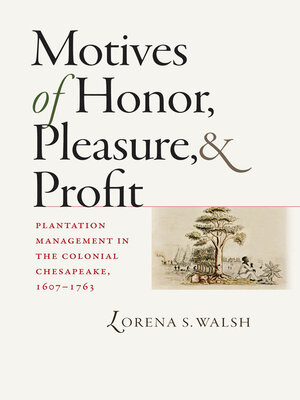Motives of Honor, Pleasure, and Profit
ebook ∣ Plantation Management in the Colonial Chesapeake, 1607-1763 · Omohundro Institute of Early American History and Culture and the University of North Carolina Press
By Lorena S. Walsh

Sign up to save your library
With an OverDrive account, you can save your favorite libraries for at-a-glance information about availability. Find out more about OverDrive accounts.
Find this title in Libby, the library reading app by OverDrive.



Search for a digital library with this title
Title found at these libraries:
| Library Name | Distance |
|---|---|
| Loading... |
Lorena Walsh offers an enlightening history of plantation management in the Chesapeake colonies of Virginia and Maryland, ranging from the founding of Jamestown to the close of the Seven Years' War and the end of the “Golden Age” of colonial Chesapeake agriculture.
Walsh focuses on the operation of more than thirty individual plantations and on the decisions that large planters made about how they would run their farms. She argues that, in the mid-seventeenth century, Chesapeake planter elites deliberately chose to embrace slavery. Prior to 1763 the primary reason for large planters' debt was their purchase of capital assets — especially slaves — early in their careers. In the later stages of their careers, chronic indebtedness was rare.
Walsh’s narrative incorporates stories about the planters themselves, including family dynamics and relationships with enslaved workers. Accounts of personal and family fortunes among the privileged minority and the less well documented accounts of the suffering, resistance, and occasional minor victories of the enslaved workers add a personal dimension to more concrete measures of planter success or failure.
Walsh focuses on the operation of more than thirty individual plantations and on the decisions that large planters made about how they would run their farms. She argues that, in the mid-seventeenth century, Chesapeake planter elites deliberately chose to embrace slavery. Prior to 1763 the primary reason for large planters' debt was their purchase of capital assets — especially slaves — early in their careers. In the later stages of their careers, chronic indebtedness was rare.
Walsh’s narrative incorporates stories about the planters themselves, including family dynamics and relationships with enslaved workers. Accounts of personal and family fortunes among the privileged minority and the less well documented accounts of the suffering, resistance, and occasional minor victories of the enslaved workers add a personal dimension to more concrete measures of planter success or failure.







